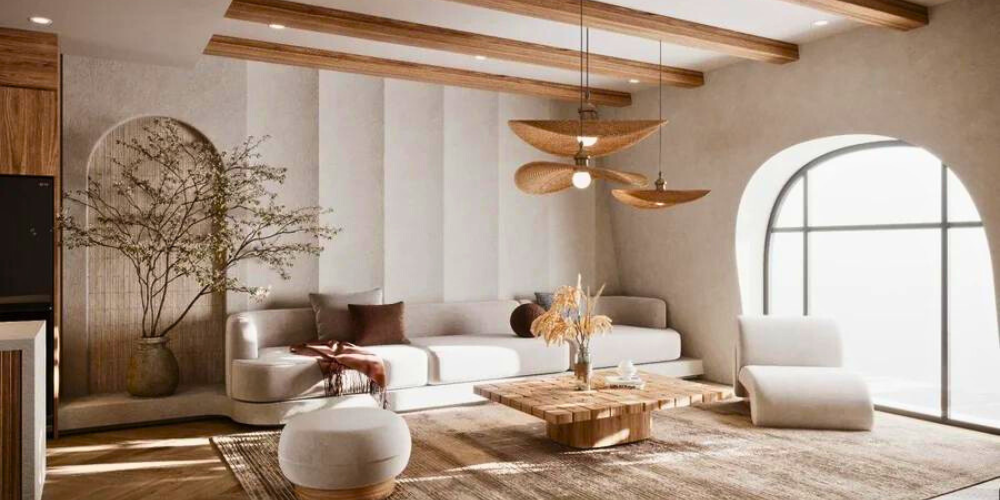A house is no longer a place to stay; it has evolved as our haven. One yearns for surroundings that foster peacefulness, concentrated focus, and calm. At the very core of these aspirations lies the philosophy of minimalism and wabi-sabi, which collaborate to design a serene yet sophisticated space. Let’s explore how to design that place with Real Estate Dekho.
Minimalism: Less is More
A concentration on simplicity and functionality defines this aesthetic. Minimalism is noticed to have clean lines, clutter-free, and a color scheme that is rather muted. The stripping of elements gave more spiciness to the initial look, letting the beauty of the materials further be revealed.
Benefits:
· Helps one focus and clearer head with less mental clutter
· Easier to clean and maintain
· Creates a feeling of peace and calm
Wabi-Sabi: The Beauty of Imperfections

Wabi-sabi is a Japanese way of living and design aesthetic that reveres the beauty in imperfect things, impermanence, and the natural passage of time. It pays homage to natural materials, asymmetry, and the patina of age. Wabi-sabi is based on the perception of beauty in transience and also praises the natural wabi—rustic simplicity—and sabi—melancholy beauty—of the world.
Benefits:
· Creates warmth and hospitality
· Develops an appreciation for a unique character in objects
· Provides a sense of connection to nature
When Minimalism Meets Wabi-Sabi: The Perfect Union
The real beauty of all this comes from how these philosophies complement each other. Minimalism will give you a clean canvas, while Wabi-sabi adds inherent depth and character.
Now, combine them in the following manner to create a harmonious blend:
· Start with a minimalist base: Clean lines, simple furniture, and a neutral color palette set the base for a spacey and peaceful design.
· Show natural materials: Wood, stone, and textiles should not be overly treated but celebrated in their natural texture. Wabi-sabi celebrates nature’s imperfections and variations.
· Embrace asymmetry: Move away from perfect balance. Asymmetrical compositions have visual interest and introduce the wabi-sabi feel.
· Highlight ONLY the unique pieces: Instead of mass-produced items, add vintage finds, handcrafted furniture, or objects with a story. Wabi-sabi celebrates the beauty of imperfection and age.
· Less is still more: While wabi-sabi invites unique pieces into your space, it’s not about going overboard. Stay with a lean, minimalist approach to avoid creating an environment that is too cluttered.
Finding Inspiration and Expertise
If you’re looking for design inspiration or need help putting these ideas into practice in your home, consider enlisting the help of an interior designer so you get a personalized space that’s uniquely yours and packed with feel-good elements. Real Estate Dekho offers a huge platform for contacting different home improvement professionals. From architect to contractor to designer, in their extensive database lies one where you’ll find the right expert to make your vision a reality.
Allow Calmness to Embrace You
Merge the simplicity of minimalism with the wabi-sabi aesthetics, and you will get an atmosphere that is at once tranquil and tasteful. Such a marriage of minimalism and wabi-sabi will realize serenity, giving you the possibility of being connected with imperfect beauty. Therefore, simplify, go back to nature, and let there be peace—a haven of peace talking of the quietude you want to live.


